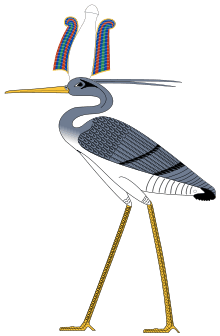Bennu

The Bennu is an ancient Egyptian deity linked with the sun, creation, and rebirth. It may have been the inspiration for the phoenix in Greek mythology.
Roles
According to Egyptian mythology, the Bennu was a self-created being said to have played a role in the creation of the world. It was said to be the ba of Ra and enabled the creative actions of Atum.[1] It was said to have flown over the waters of Nun that existed before creation, landing on a rock and issuing a call that determined the nature of creation. It was also a symbol of rebirth and was therefore associated with Osiris.[2]
Some of the titles of the Bennu bird were "He Who Came Into Being by Himself",[1] and "Lord of Jubilees"; the latter epithet referred to the belief that the Bennu periodically renewed itself like the sun.[2] Its name is related to the Egyptian verb wbn, meaning "to rise in brilliance" or "to shine".[1]
Depiction
| |||||
| Bennu or heron in hieroglyphs |
|---|
The Pyramid Texts refer to the yellow wagtail as a symbol of Atum, and it may have been the original form of the Bennu bird. New Kingdom artwork shows the Bennu as a grey heron with a long beak and a two-feathered crest, sometimes perched on a benben stone (representing Ra) or in a willow tree (representing Osiris). Because of its connection with Osiris, it sometimes wears the atef crown.[2]
A large species of heron, nowadays extinct, occurred on the Arabian Peninsula in comparatively recent times; it may have been the ultimate inspiration for the Bennu. Reflecting this, the species was described as the Bennu heron (Ardea bennuides).
Worship
Like Atum and Ra, the Bennu was probably worshipped in their cult center at Heliopolis.[2] It also appears on funerary scarab amulets as a symbol of rebirth.[1]
Connection with the phoenix
The Greek historian Herodotus, describing Egypt in the fifth century BC, wrote that the priests at Heliopolis described the phoenix to him. They said it lived for 500 years before building its own funerary pyre and setting it alight. The newborn offspring of the previous phoenix rose from the ashes of this fire and carried them to Heliopolis, depositing them on the temple's altar. Greek descriptions of the phoenix liken it to an eagle with red and gold plumage, reminiscent of the sun or of flames.[2] The name of the phoenix could be derived from "Bennu", and its rebirth and connections with the sun resemble those of the Bennu bird, although Egyptian sources do not mention the bird's death.[1]
Citations
Further reading
- Labrique, Françoise (2013). "Le regard d’Hérodote sur le phénix (II, 73)". In Coulon, Laurent; Giovannelli-Jouanna, Pascale; Kimmel-Clauzet, Flore. Regards croisés sur le Livre II de l’Enquête d’Hérodote. Actes de la journée d’étude organisée à la Maison de l’Orient et de la Méditerranée – Lyon, le 10 mai 2010 (in French). Maison de l’Orient et de la Méditerranée. ISBN 978-2-35668-037-2.
External links
![]() Media related to Bennu at Wikimedia Commons
Media related to Bennu at Wikimedia Commons